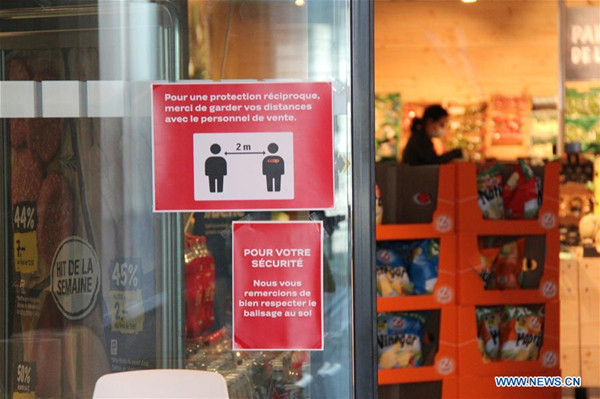Pandemic presents window of opportunity to care for each other
- By Wu Jin
 0 Comment(s)
0 Comment(s) Print
Print E-mail China.org.cn, April 20, 2020
E-mail China.org.cn, April 20, 2020

Andreas Keller, a 45-year-old Swiss Life Science Service Manager, has encountered the COVID-19 outbreak twice — first in China and then in Switzerland.
Keller and his wife, Zhang Zhan, left Zurich, Switzerland, to Chongqing Municipality, China, where they had planned to celebrate the Chinese Lunar New Year with Zhang's family on Jan. 25.
However, they didn't anticipate that the COVID-19 outbreak would deprive them of meeting their Chinese relatives.
Keller recalled, at that time, when the city adopted a self-isolation approach as one of its anti-virus efforts, and he had to put on a face mask and stand at a distance when chatting with his aunts-and-uncles-in-law.
"It was bizarre to celebrate the most important festival in China like this," he said.
However, when Keller and Zhang went back to Switzerland, they encountered the outbreak a second time. According to Keller, this has been the grimmest challenge facing Switzerland since World War II.
"I was not scared for myself, but I was more concerned about my mom and people with higher risks to get COVID-19 due to their age or any disease," he said.
Keller and his mother do not live near each other. At this point, it had been difficult for them to visit each other since the government recommended home isolation as one of the important approaches to contain the virus.
On April 11, 2020, the remaining number of confirmed cases in Switzerland declined to 11,971, 478 cases less than a day before. According to the Federal Office of Public Health, the growth curve of infections reached an inflection point, even though authorities assumed there were still additional weeks ahead until the epidemic can be put under control.
Keller believed that the well-disciplined Swiss people have followed the government's advice to stay at home.
"The government, doctors, nurses, caregivers, Swiss Armed Forces, and volunteers all do a great job. What is equally important is that the Swiss people are strictly following the rules from the government. People can still go out, but they need to follow social distancing rules," he explained.
In the economic sector, the Swiss government and banks have introduced government-guaranteed loans as an interim measure for Swiss businesses and individuals, especially those on the brink of bankruptcy.
According to the local press, Ueli Maurer, the Swiss Finance Minister, made 20 billion Swiss francs (US$20.68 billion) available for companies in need from a special fund last month.
By March 20, the Swiss government had adopted a slew of financial measures worth 42 billion Swiss francs to mitigate the economic consequences of the COVID-19 pandemic.
At the same time, social order remains stable and the Swiss people remain kind to them, which means Keller's worry of xenophobia towards Chinese people proved unnecessary.
"My wife is Chinese, and I feared that people would discriminate Chinese people when they did not know how this virus started," Keller expounded.
He also stressed the importance of mutual learning to help fight the pandemic together.
"We must all focus on public health, and that's why Chinese experts have achieved positive results," Keller said.
Keller suggested that Swiss experts could make contributions to China since his country is at the forefront of life science research and technology.
The Swiss man also hopes the post-pandemic situation will involve people being more caring towards others.
"I hope that people will be more sensitive towards others instead of thinking about themselves all the time and being selfish," he said.
"I hope our behavior toward old and weak people can change. Unlike the family structure in China, we don't live with our parents, but I still hope we could spend more quality time together," he added.





